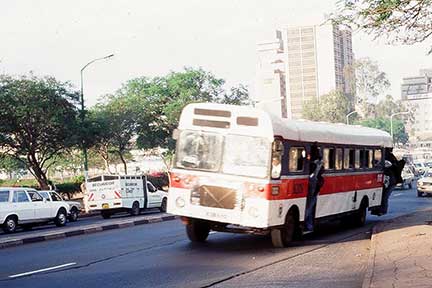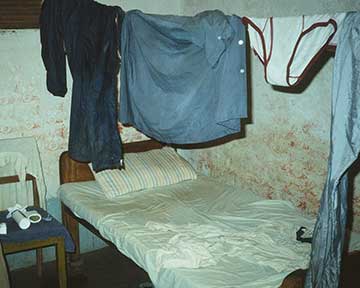 An African Bus Ride
An African Bus Ride
March 7, 1988
At the Minnesota State Fair, we paid $1.50 for a three-minute amusement park ride. In Kenya, it cost only $3.00 for a hair-raising, six-hour roller coaster ride from Mombasa to Tavati in the back of an African bus. We were en route to Nygorongoro Crater in Tanzania.
It was the first African bus we'd seen in which nearly everyone was seated. On local and city buses, they load people on until there's not a square centimeter of space left and then folks hang out the doors. Imagine trying to make your way out from a back seat when you reach your stop! Only the ticket taker was skilled at navigating through the crush.
At least in Kenya there are seats. In Cameroon and some other countries, they'd discovered you can cram in more paying passengers if you take the seats out.
As we were loading, a young man removed my pack from the overhead rack and replaced it with 32 cases of shortening. The first big bump we hit knocked some of the cases from the rack and one nearly hit a woman in the head. The man got up and rearranged them all. When he returned to his seat, another man had occupied it. A shouting match ensued, with some tussling thrown in. Soon everyone on the bus chose sides, with the exception of the driver and ticket-taker, who seemed content to let them fight it out on their own. People were shouting in Swahili, cheering, and clapping as the argument progressed. Eventually, the interloper was unseated, his shirt badly torn, to the cheers of the crowd.
At one point, the bus chugged up a hill on the wrong side of the road, laboring to overtake a long lorry (semi-tractor trailer truck). The crest of the hill came closer and closer. It was hard not to imagine an overloaded matatu (minibus or similar vehicle used as a taxi) racing up the opposite side of the hill at 80 mph. Fortunately, the matatu was imaginary, and we made it past the truck just as we reached the crest. The sweat on our bodies at that moment was not from the 85 degree heat.
During our stay, more than 30 people in three vehicles were killed in an almost identical situation. Two matatus, one in the process of passing a bus ascending a hill, collided head on.
We arrived at Voi just about sundown and bought refreshments from street hawkers—boiled eggs, Cokes, cashews, and fruit drinks.
From Voi to Tavati was rough dirt road. As the bus thundered down a hill, its headlights flickered off. The driver braked and they flickered back on. For the next two hours, they were off an increasing percentage of the time. We navigated largely by starlight.
Once when the lights went off completely, the bus slowed to a stop. "Maybe now someone will get out and fix them," I thought. A moment later they flickered on again, illuminating eight or nine large animals crossing the road just in front of us.
"Lions!" I exclaimed. Masai in the seat ahead of us had seen them, too, and were chattering with excitement. The Masai have a close relationship with lions. Even in modern times, I've read, a young Masai warrior is expected to kill a lion with only a spear in order to prove his manhood and claim a bride. He presents the lion's tail to the girl's father.
The Masai ran out with their spears and followed the lions into the inky black night.
Later, the bus stopped and an attempt was made at repairs (after the driver carefully checked surrounding bushes with a flashlight). The lights couldn't be fixed, so for the last 20 miles or so, a man with the flashlight hung out the door to slightly illuminate the road ahead. Unfortunately, there was no moon. Nights near the equator can be very dark.
 We arrived in Tavati about midnight. Shouldering our packs, we wondered where we could sleep for the night. We saw no electric lights, and this was supposedly the middle of town! We had all our important stuff with us. Might there be thieves in the dark streets?
We arrived in Tavati about midnight. Shouldering our packs, we wondered where we could sleep for the night. We saw no electric lights, and this was supposedly the middle of town! We had all our important stuff with us. Might there be thieves in the dark streets?
We asked the bus driver for assistance. He summoned a rough-looking teenager and told him to guide us to a hotel. As we followed him through deserted and narrow streets, I became more and more uneasy. This did not seem a safe situation.
But the young man took us straight to a hotel, where we rented a tiny (safe) room for $3.00. We were so thankful for the boy's honesty that Dennis gave him a very generous tip. He had more than earned it.
Go on to Flight to Italy
Source: www.SusanCAnthony.com, ©Susan C. Anthony
